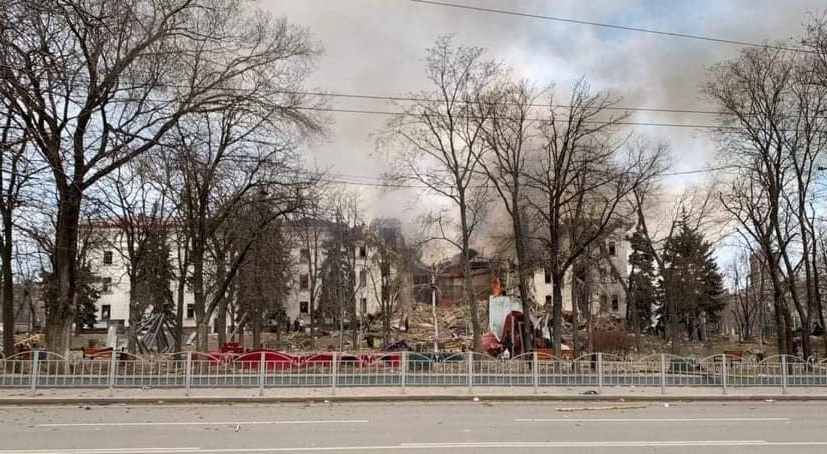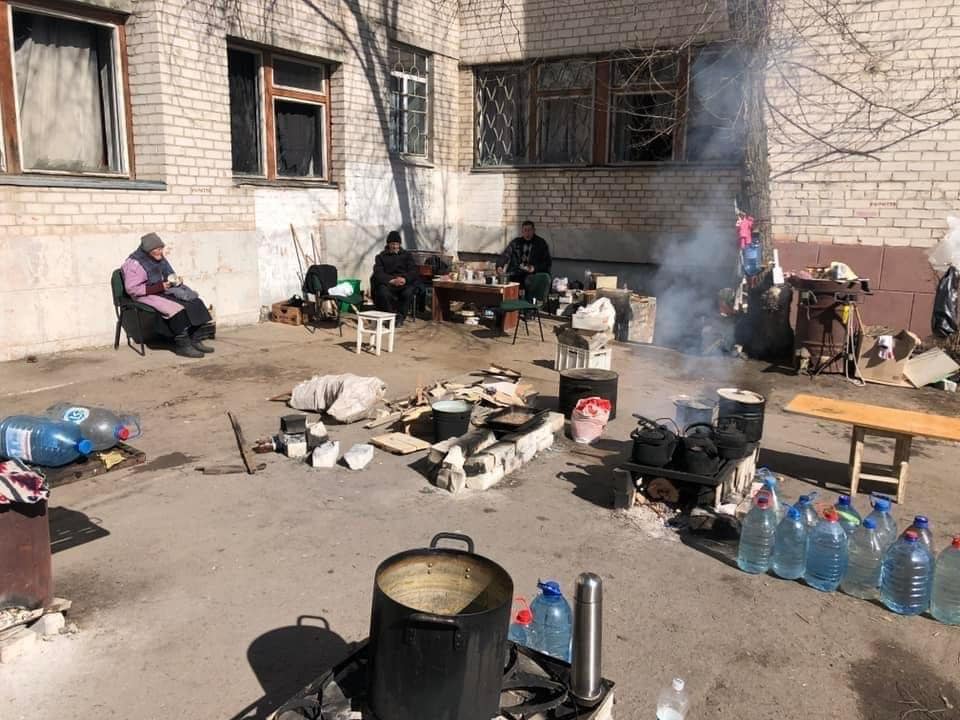It’s hard to make a plan for every contingency, but thinking beyond today’s relative safety is the first step. The world is changing. It can happen here.
The Ukrainian military and volunteer militia have punched surprisingly far above their weight in the month-old war. However, civilian stories coming out of the conflict underscore the universal truth that war is hell no matter who wins. For most Americans, open combat is something that happens “over there,” on some far away continent, but resurgent violence in Europe is a reminder that it can happen here. In an uncertain future sure to be affected by resource decline, more natural disasters, climate migrations, and partisan clashes, maybe there’s something we can learn from everyday Ukrainians affected by the war. It’s time to make a plan.
On March 16th, Russian forces bombed the Soviet-era drama theater in Mariupol, despite the word “Children” being written around it in Russian letters so large they could be easily read from the air. (It wouldn’t be the first time – or the second – that Russia did this sort of thing on purpose, so perhaps it’s a better idea not to let Russian troops know where the kids are hidden if they go to war with you.) Mariia Rodionova, a 27 year old teacher, had been sheltering at the theater for 10 days, and stepped out for a moment to search for water for her dogs when the bomb fell. With children screaming everywhere, she reached for her first aid kit and realized it was now buried in the remains of the theater.

After she recovered from the shock, Mariia realized she had to leave the city behind. After failing to catch a ride with random cars she tried to stop, she simply walked along the coast for days. What would you do, if the city where you live became uninhabitable? Do you know people in different directions who may be able to help? Make a plan to reach them even if you don’t have motorized transportation. It may not be bombs and missiles, but it could be a tornado, flash flood, or earthquake that sends survivors evacuating any way they can.
This Tumblr user‘s family is from Kharkiv, Ukraine, and they’ve been able to watch the human side of the war unfold over the internet. The first thing that happened, they say, was that public transportation stopped running and gasoline became hard to find. Businesses, factories and stores all closed. People left. Not everyone is able or can afford to leave, though, and those who stay still need to buy or find food and water, heat (even when there’s no electricity or gas), and fix their homes or apartments when the war puts holes in them. It’s surreal to think about, but when you live in a war zone, surviving the war becomes the normal way of life.
It’s hard to make a plan when conditions change from day to day and you never know what’s going to happen next. The municipal employees that remained in Kharkiv have worked hard to restore utilities, sometimes building by building, and to fix windows broken by Russian shelling, an important consideration when winter is not yet over. However, where city services have become spotty or ceased altogether, mutual aid is the thing keeping everybody upright. Groups of volunteers have been checking in on the elders, bringing food, water, medicine and other essentials, and helping move wheelchairs for people evacuating. It’s best to bring people aid individually or in small groups, because gathering everyone together in one place means they can all be hit by one well-aimed bomb, and always bring extra because there are always more people who need it.
The best time to get to know your neighbors and make a plan for mutual aid is before you’re chest deep in an emergency. Think about the ways you and your community would be affected. Would food supplies be cut off? How could you provide light and heat (or cooling) if the power goes out? Do you have enough prescription medicines on hand, should supply chains break down? While the United States probably doesn’t have to worry about attacks across the border from Canada, there are homegrown elements increasingly interested in turning this country into a civil war zone.
Soyoung Q. Park is a Berlin neuroscientist who volunteered to shelter Ukrainian refugees. When the phone rang at half-past midnight asking if she could receive a mother, two kids, and their cat, she was ready. The family she picked up had been traveling for four days, they needed medicine, and they could only communicate with the help of Google Translate. Suddenly, said Park, “the war came home.”
Once the Ukrainian family realized that they were safe, they slept all day and all night, but Park’s work had just begun. She began rallying volunteers across Germany, asking if they would be willing to host refugees. Park says that she can’t fix the big problems, but comforting and supporting the refugees is something she could do, that gave her focus.
War affects not only those doing the fighting or even trying to find dog food when the stores are empty and going out on the street could be a life-ending decision. It can affect people hundreds of miles away, suddenly awash in refugees seeking shelter and safety from the shooting. War interrupts supply chains, both immediately and for months or years to come. A big enough war affects the whole world.
Imagine being the mother from Mariupol who arrived as a refugee in Hungary with four children: her own, the niece or nephew she took in when her sister went out looking for water and never came home, the child of neighbors who were killed, and another boy she found on the way out of town who was sitting in the street next to his dead parents.
This is apocalyptic stuff. Nobody should have to face it, but face it they do. It’s hard, maybe impossible, to make a plan to cover every wartime contingency, but thinking about it is the first step. Because no matter how safe and stable life seems today, past performance is no guarantee of future returns. The world is changing. It can happen here.
Related: Carrying Capacity Still Matters Today


Join the conversation!